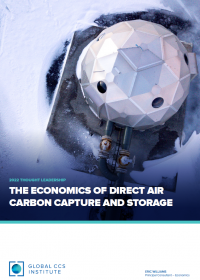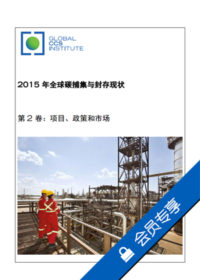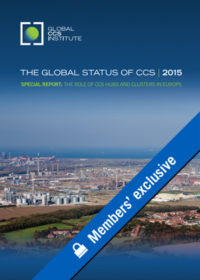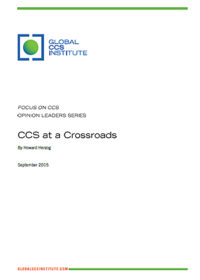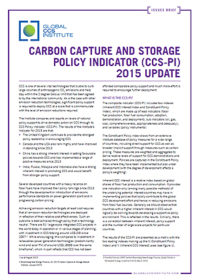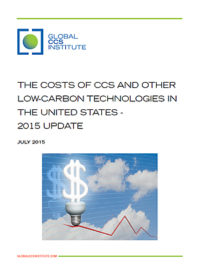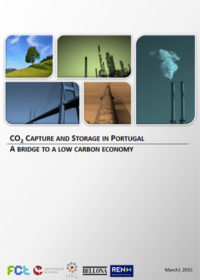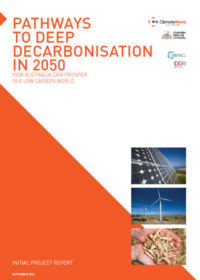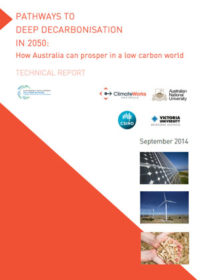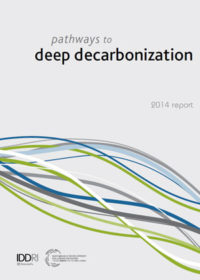Resources
Publications
Our publications, reports and research library hosts over 500 specialist reports and research papers on all topics associated with CCS.
View our Publication Library Disclaimer.
Filter by
The Economics of Direct Air Carbon Capture and Storage
26th July 2022
Topic(s): Carbon capture and storage (CCS), CO2 removals, Direct air carbon capture and storage (DACCS), Economics
Carbon capture and storage (CCS) is a set of technologies that capture CO2 from large emission sources or from the atmosphere and safely stores it underground or permanently in products. As the scale and urgency of climate action has become clearer in recent years and governments and companies have done the necessary work to map their own pathways to climate neutrality, carbon dioxide removal (CDR) technologies - direct air carbon capture and storage (DACCS) in particular - have become a focal point in climate mitigation.
This paper explores the economics of DACCS, relying on the economic model described in the methodology, in which actors within the energy system are free to pursue least-cost options in meeting net-zero pathways. The intent of the paper is a thought experiment to show how DACCS deployment might affect the global energy system. It focuses solely on the cost of DACCS - applying no additional policy assumptions - and is not a forecast.
The paper finds that:
- DACCS plays a unique role among technological climate mitigation options as it can function as a backstop technology, potentially avoiding climate disaster if other low-cost pathways are not realised.
- Low-cost DACCS, should it be realised, would reduce the total cost of decarbonisation and meeting climate goals.
- If DACCS deployment is limited due to high costs, the main decarbonisation pathway for industry and transport (except light duty vehicles, which are electrified) is hydrogen.
- Electricity generation, buildings, and light vehicles are largely unaffected by the deployment of DACCS and decarbonise through increased efficinecy and renewable energy pathways.
- The challenge inherent for governments is to implement policy and provide incentives for immediately available mitigation pathways, while supporting the development and commercialisation of lower-cost DACCS.
Download a description of the economic model used in this paper here.
Disclaimer
The content within the Global CCS Institute Publications, Reports and Research Library is provided for information purposes only. We make every effort and take reasonable care to keep the content of this section up-to-date and error-free. However, we make no claim as to its accuracy, currency or reliability.
Content and material featured within this section of our website includes reports and research published by third parties. The content and material may include opinions and recommendations of third parties that do not reflect those held by the Global CCS Institute.
CCS Policy Indicator (CCS-PI)
16th October 2018
Organisation(s): Global CCS Institute
Topic(s): Carbon capture use and storage (CCUS), Economics, Policy law and regulation, Project financing
Government policy, given effect through law and the allocation of public resources, is critical to achieving climate targets. It plays a material role in determining the return on investment for any climate mitigation technology making confidence in government policy a pre-requisite of investment.
The CCS-PI tracks the development of government policy to accelerate the deployment of CCS as an essential climate mitigation technology in over 100 countries.
Disclaimer
The content within the Global CCS Institute Publications, Reports and Research Library is provided for information purposes only. We make every effort and take reasonable care to keep the content of this section up-to-date and error-free. However, we make no claim as to its accuracy, currency or reliability.
Content and material featured within this section of our website includes reports and research published by third parties. The content and material may include opinions and recommendations of third parties that do not reflect those held by the Global CCS Institute.
The Carbon Capture and Storage Readiness Index 2018: Is the world ready for carbon capture and storage?
16th October 2018
Topic(s): Carbon capture use and storage (CCUS), Economics, Policy law and regulation
Collectively, our three Indicator Reports 2018 form a further, criteria-based assessment known as the CCS Readiness Index, or CCS-RI. The 2018 CCS-RI examines over 50 countries using 70 discrete criteria and enables a comparative assessment of countries globally.
Clear from the 2018 assessment is that greater effort is required to deploy CCS at the scale necessary to meet climate change mitigation ambitions.
Disclaimer
The content within the Global CCS Institute Publications, Reports and Research Library is provided for information purposes only. We make every effort and take reasonable care to keep the content of this section up-to-date and error-free. However, we make no claim as to its accuracy, currency or reliability.
Content and material featured within this section of our website includes reports and research published by third parties. The content and material may include opinions and recommendations of third parties that do not reflect those held by the Global CCS Institute.
2015年全球碳捕集与封存现状。第2卷:项目、政策和市场
18th February 2016
Topic(s): Carbon capture use and storage (CCUS), Economics, Engineering and project delivery, Policy law and regulation
“第二卷:项目、政策和市场”详述了全球CCS项目和政策发展和在北美、亚洲、欧洲、中东与非洲的区域趋势。此卷还提供了一份关于大型CCS项目和值得注意的项目的数据的综合纲要。
Disclaimer
The content within the Global CCS Institute Publications, Reports and Research Library is provided for information purposes only. We make every effort and take reasonable care to keep the content of this section up-to-date and error-free. However, we make no claim as to its accuracy, currency or reliability.
Content and material featured within this section of our website includes reports and research published by third parties. The content and material may include opinions and recommendations of third parties that do not reflect those held by the Global CCS Institute.
The global status of CCS: 2015. Special report: the role of CCS hubs and clusters in Europe
4th November 2015
Topic(s): Carbon capture use and storage (CCUS), CO2 hubs, CO2 utilisation, Economics
This question and answer style special report focuses on the role CCS hubs and clusters can play in enhancing the deployment of CCS in Europe, especially in the context of reducing emissions from industrial processes.
Disclaimer
The content within the Global CCS Institute Publications, Reports and Research Library is provided for information purposes only. We make every effort and take reasonable care to keep the content of this section up-to-date and error-free. However, we make no claim as to its accuracy, currency or reliability.
Content and material featured within this section of our website includes reports and research published by third parties. The content and material may include opinions and recommendations of third parties that do not reflect those held by the Global CCS Institute.
CCS at a crossroads
23rd September 2015
Topic(s): Carbon capture use and storage (CCUS), Economics, Policy law and regulation
Howard Herzog's article, CCS at a crossroads, is part of an opinion leader’s article series for Focus on CCS. The series features contributions from world leading authorities on carbon capture and storage (CCS), presenting their perspectives on the role for the technology in reducing our carbon dioxide emissions. The series is published by the Global CCS Institute to contribute to the conversation about CCS within the portfolio of options to help tackle climate change.
Howard J. Herzog is a Senior Research Engineer in the MIT Energy Initiative.
Disclaimer
The content within the Global CCS Institute Publications, Reports and Research Library is provided for information purposes only. We make every effort and take reasonable care to keep the content of this section up-to-date and error-free. However, we make no claim as to its accuracy, currency or reliability.
Content and material featured within this section of our website includes reports and research published by third parties. The content and material may include opinions and recommendations of third parties that do not reflect those held by the Global CCS Institute.
Carbon Capture and Storage Policy Indicator (CCS-PI): 2015 update
2nd September 2015
Topic(s): Carbon capture use and storage (CCUS), Carbon markets, Domestic policy, Economics, Policy law and regulation
The Institute has developed an analytical framework to derive a composite indicator that compares levels of national policy support to drive domestic action on CCS.
This 2015 update of the CCS Policy Indicator includes some important developments that have occurred in several major countries since it was last published in 2013.
Disclaimer
The content within the Global CCS Institute Publications, Reports and Research Library is provided for information purposes only. We make every effort and take reasonable care to keep the content of this section up-to-date and error-free. However, we make no claim as to its accuracy, currency or reliability.
Content and material featured within this section of our website includes reports and research published by third parties. The content and material may include opinions and recommendations of third parties that do not reflect those held by the Global CCS Institute.
The costs of CCS and other low-carbon technologies in the United States: 2015 update
27th July 2015
Topic(s): Carbon capture use and storage (CCUS), Economics
This paper examines costs of major low and zero emissions technologies currently available in power generation and compares them in terms of emissions reduction potential and costs. The analysis uses cost and performance data from several recent studies in the United States, and applies a common methodology and economic parameters to derive comparable lifetime costs per generation output and of CO2 avoided.
The analysis demonstrates that CCS is a cost competitive power sector emissions reduction tool when considered among the range of available low and zero emissions technologies. While CCS adds additional costs to traditional fossil fuel generation, the underlying coal and gas generation technology and fuel sources are relatively cheap, and CCS has higher rates of utilisation than some renewables technologies.
This publication updates the 2011 edition of The costs of CCS and other low-carbon technologies.
Disclaimer
The content within the Global CCS Institute Publications, Reports and Research Library is provided for information purposes only. We make every effort and take reasonable care to keep the content of this section up-to-date and error-free. However, we make no claim as to its accuracy, currency or reliability.
Content and material featured within this section of our website includes reports and research published by third parties. The content and material may include opinions and recommendations of third parties that do not reflect those held by the Global CCS Institute.
CO2 capture and storage in Portugal: a bridge to a low carbon economy
1st April 2015
Topic(s): Carbon capture use and storage (CCUS), CO2 capture, CO2 storage, Economics
This report evaluates the role the CCS technology could play in the Portuguese energy and industry system as a mitigation option to achieve deep GHG emissions reductions. The cost effectiveness of its deployment, and the risks and additional benefits it may provide for economic development are also analysed.
The partners of the CCS-PT: Perspectives for capture and sequestration of CO2 in Portugal project authored this report:
- CENSE Research Group, FCT - Universidade Nova de Lisboa
- CGE Research Group, Universidade de Évora
- Laboratório Nacional de Energia e Geologia
- REN – Rede Eléctrica Nacional, S.A.
- Bellona Foundation
The Global CCS Institute supplied financial and technical contributions.
Sumário (Portuguese Summary)
O presente relatório avalia o papel que a tecnologia de CAC poderá desempenhar no sistema energético e industrial Português para atingir reduções significativas de emissões de GEE. São analisadas as condições que determinam o seu custo-eficácia, e os riscos e benefícios adicionais.
Disclaimer
The content within the Global CCS Institute Publications, Reports and Research Library is provided for information purposes only. We make every effort and take reasonable care to keep the content of this section up-to-date and error-free. However, we make no claim as to its accuracy, currency or reliability.
Content and material featured within this section of our website includes reports and research published by third parties. The content and material may include opinions and recommendations of third parties that do not reflect those held by the Global CCS Institute.
Pathways to deep decarbonisation in 2050: how Australia can prosper in a low carbon world
23rd September 2014
Topic(s): Carbon capture use and storage (CCUS), Economics, Energy efficiency, Fuel switching, Nuclear energy, Renewables
Pathways to Deep Decarbonisation in 2050: How Australia Can Prosper in a Low Carbon World presents an illustrative deep decarbonisation pathway for Australia - just one of many possible pathways - developed using a combination of well-established modelling tools to identify feasible and least-cost options. The frame of reference for the analysis is that all countries decarbonise by 2050, consistent with the objective of limiting the increase in global mean surface temperature to 2°C in order to avoid dangerous climate change.
This initial project report shows that Australia can achieve net zero emissions by 2050 and live within its recommended carbon budget, using technologies that exist today (including carbon capture and storage), while maintaining economic prosperity. Major technological transitions are needed in some industries and many activities, but no fundamental change to Australia’s economy is required. Economic activity and Australian incomes keep rising. The economy grows by 150% to 2050, while net emissions fall to zero and energy sector emissions are reduced by more than four fifths.
This report is accompanied by the Technical Report which gives detail on assumptions, data, modelling tools and detailed results.
Disclaimer
The content within the Global CCS Institute Publications, Reports and Research Library is provided for information purposes only. We make every effort and take reasonable care to keep the content of this section up-to-date and error-free. However, we make no claim as to its accuracy, currency or reliability.
Content and material featured within this section of our website includes reports and research published by third parties. The content and material may include opinions and recommendations of third parties that do not reflect those held by the Global CCS Institute.
Pathways to deep decarbonisation in 2050: how Australia can prosper in a low carbon world. Technical report
23rd September 2014
Topic(s): Carbon capture use and storage (CCUS), Economics, Energy efficiency, Fuel switching, Nuclear energy, Renewables
This report presents the technical analysis supporting ClimateWorks’ Pathways to Deep Decarbonisation in 2050: How Australia Can Prosper in a Low Carbon World. It provides readers with details on assumptions, data, and modelling tools. This Technical Report provides detailed results and a discussion of limitations.
Disclaimer
The content within the Global CCS Institute Publications, Reports and Research Library is provided for information purposes only. We make every effort and take reasonable care to keep the content of this section up-to-date and error-free. However, we make no claim as to its accuracy, currency or reliability.
Content and material featured within this section of our website includes reports and research published by third parties. The content and material may include opinions and recommendations of third parties that do not reflect those held by the Global CCS Institute.
Pathways to deep decarbonization: 2014 report
19th September 2014
Topic(s): Carbon capture use and storage (CCUS), Economics, Energy efficiency, Fuel switching, Nuclear energy, Renewables
This 2014 report by the Deep Decarbonization Pathway Project (DDPP) summarises preliminary findings of the technical pathways developed by the DDPP Country Research Partners with the objective of achieving emission reductions consistent with limiting global warming to less than 2°C., without, at this stage, consideration of economic and social costs and benefits.
Disclaimer
The content within the Global CCS Institute Publications, Reports and Research Library is provided for information purposes only. We make every effort and take reasonable care to keep the content of this section up-to-date and error-free. However, we make no claim as to its accuracy, currency or reliability.
Content and material featured within this section of our website includes reports and research published by third parties. The content and material may include opinions and recommendations of third parties that do not reflect those held by the Global CCS Institute.
